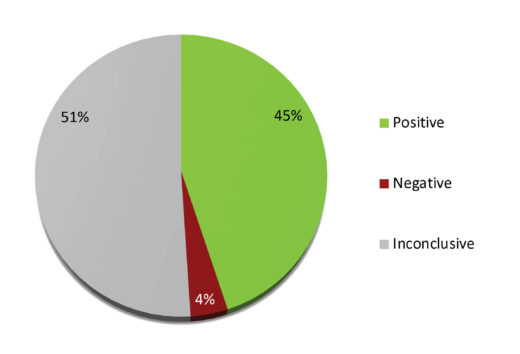False: “There is no scientific evidence that homeopathy works”
This is probably the most frequently quoted, completely inaccurate statement about homeopathy. Homeopathy research is a relatively new field, so it’s true to say that there are not a huge number of studies, but some evidence is very different from no evidence.
By the end of 2020, 233 randomised controlled trials of homeopathic treatment for 129 medical conditions had been published in peer-reviewed journals and were eligible for our review.
Of these, 140 were double-blind, randomised, placebo-controlled trials, covering 86 different medical conditions:1:
- 45% were positive (63 trials) – finding that homeopathy was effective
- 4% were negative (5 trials) – finding that homeopathy was ineffective
- 51% were inconclusive (72 trials)
140 RCTs of homeopathy (end of 2020)

Chart A
Full list of randomised placebo controlled trials.
How does this compare with evidence for conventional medicine?
1128 systematic reviews of RCTs of conventional medicine
Chart B
An analysis of 1128 systematic reviews of RCTs of conventional medicine had strikingly similar findings2:
- 45% were positive – the treatments were likely to be beneficial
- 10% were negative – the treatments were likely to be harmful
- 45% were inconclusive – the evidence did not support either benefit or harm.
Although the percentages of positive, negative and inconclusive results are similar in homeopathy and conventional medicine, it is important to recognise a vast difference in the quantity of research carried out. Chart A shows analysis of 140 studies out of a total of 233 individual trials on homeopathy. By contrast, chart B shows analysis of 1128 out of over 4000 Cochrane systematic reviews on conventional medicine published by 2011, each analysing multiple individual trials.
This highlights the need for more research in homeopathy, particularly large-scale high quality repetitions of the most promising positive studies.
The difference in quantity is also not surprising when one considers the tiny amounts of funding made available for research into ‘complementary and alternative medicine’ (CAM). For example, in the UK only 0.0085% of the total medical research budget is spent on CAM, of which homeopathy is only one example.3
- https://www.hri-research.org/
- Full list of randomised placebo controlled trials in Chart A | Link
- Boas PJFV, Spagnuolo RS, Kamegasawa A, et al. Systematic reviews showed insufficient evidence for clinical practice in 2004: what about in 2011? The next appeal for the evidence-based medicine age. J Eval Clin Pract, 2013; 19(4):633-7 | PubMed
- Lewith GT. Funding for CAM. BMJ., 2007; 335(7627): 951. | PubMed


